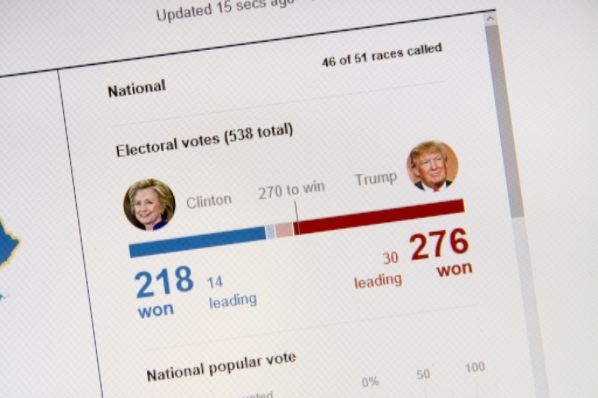Well, the presidential election is finally over–we think.
Actually, the election was supposed to be over a month and a half ago, on Nov. 8. But supporters of losing Democratic candidate Hillary Clinton wouldn't let go, and decided to turn the formality of the Electoral College's ratification of the results into a second go-round. Hence, the "Hamilton Elector" campaign. The idea was that Alexander Hamilton had written in Federalist No. 68 that the College was supposed to be a body “of men most capable of analyzing the qualities adapted to the station, and acting under circumstances favorable to deliberation.”
Perusing the Federalist Papers was undoubtedly a first-time experience for the diehard liberals in the Clinton camp. Usually it's conservatives who champion the limited-government principles enunciated by Hamilton and his proto-Republican Party confreres John Madison and John Jay in those august pamphlets. But the austere Hamilton has been repackaged as an immigrant rap artist, so he's now a formidable liberal icon. His supporters also now delicately glide over that sexist word "men" in Hamilton's Federalist 68 as they've used his words to insinuate that the Electoral College's job is to veto their states' popular votes.
So indeed a record number of electors went Full Hamilton and either voted or tried to vote against their states' presidential choice. The only problem–oops!–is that all but two of them used their newfound claim of veto power to vote against Hillary Clinton–not exactly what the Hamilton Elector people had in mind.
Politico reports:
Eight Democratic electors attempted to vote against Clinton — four in Washington state and one each in Minnesota, Maine, Hawaii and Colorado. But three of the eight who attempted to buck Clinton were replaced by state election officials, raising questions about whether their "faithless" votes will be counted. In Colorado, a leader of the anti-Trump Democratic electors, Micheal Baca, was replaced by Republican Secretary of State Wayne Williams for his attempted faithless vote. A Minnesota elector was replaced as well and in Maine, elector David Bright initially cast a vote for Bernie Sanders but recast it for Clinton after he was deemed out of order.
The most tumult occurred in Washington state, where four Democrats broke ranks and rejected Clinton. Three voted for Colin Powell, marking the first electoral votes for an African-American Republican, and the first time in history a major party elector crossed the aisle and supported a candidate of the opposing major party. The fourth elector, Robert Satiacum, cast his ballot for Faith Spotted Eagle, a Native American environmental activist.
So you might say that the Hamilton Electors functioned more like Aaron Burr Electors–and the upshot was that poor Hillary Clinton lost the presidency not once but twice.
Meanwhile liberals are still trying their darnedest to get rid of the Electoral College, period, as they do whenever a Dem candidate wins the popular vote but neglected to secure enough states for the vote that actually counts. Los Angeles Times op-ed contributor Kenneth Jost (a former newspaper boss of mine) even opined recently that the Supreme Court could overturn the Constitution's Article 2 setting up the College, so the liberals wouldn't have to go through the cumbersome ratification process for a constitutional amendment: Wrote Jost:
The electoral college is enshrined in the Constitution, but that doesn’t necessarily make it constitutional.
Um, uh…if it's in the Constitution, it's constitutional. But if you can switch Hamilton into a liberal, you can switch around just about anything.


